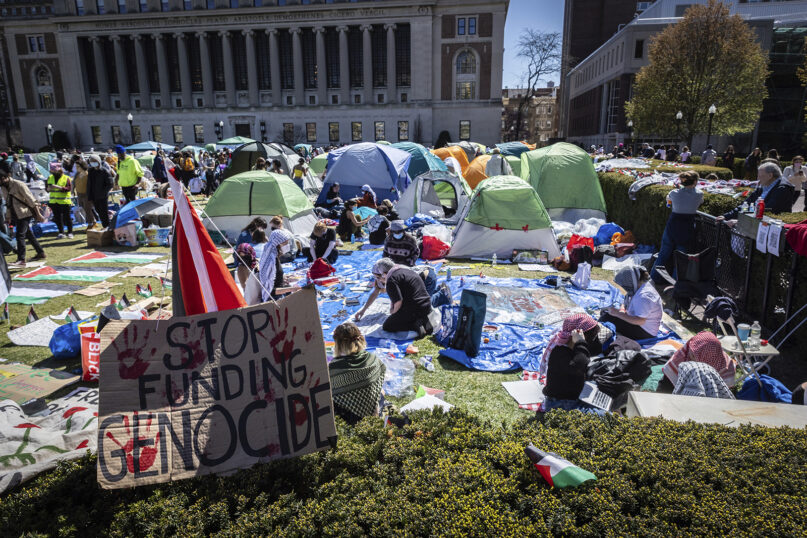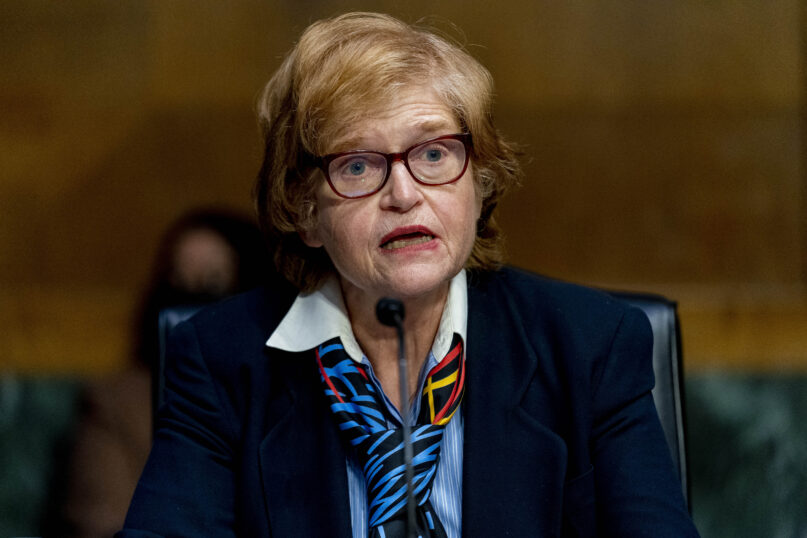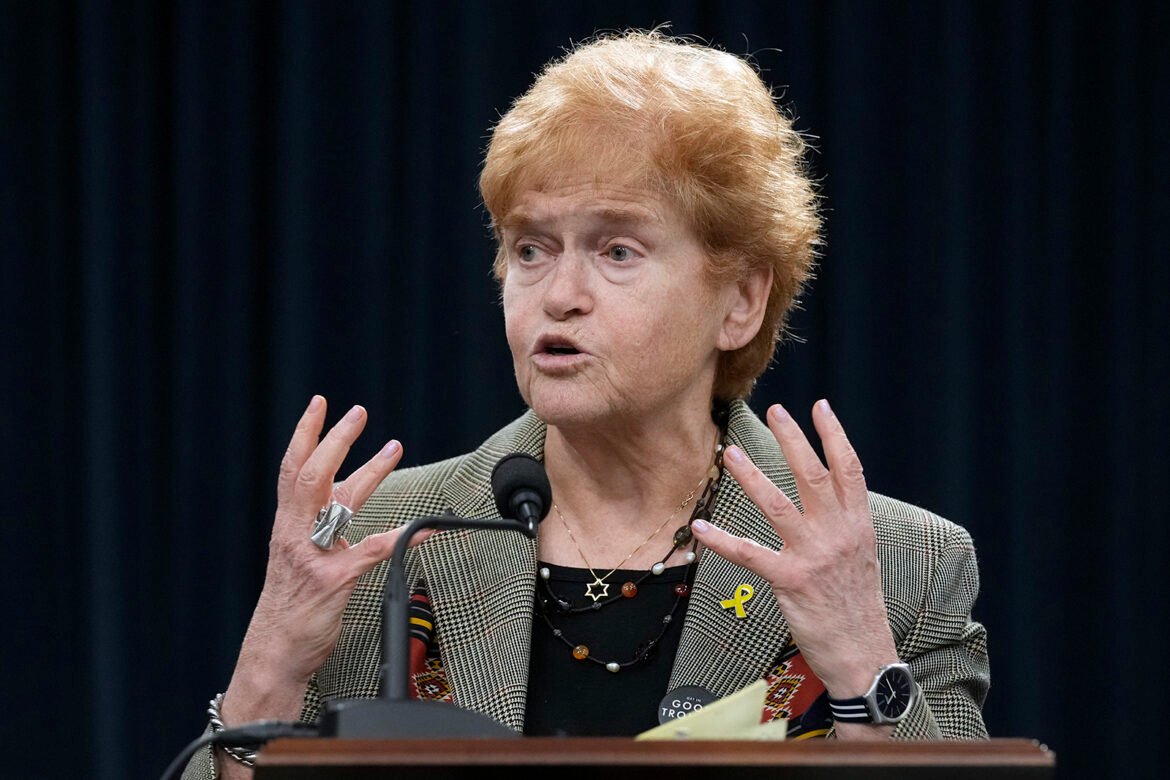(RNS) — American Jews are split over President Donald Trump’s combative tactics to address antisemitism.
Some on the right welcome the administration’s efforts to deny elite universities billions of dollars in funding and deport foreign students allegedly involved in anti-Israel campus protests — all in the name of fighting antisemitism. On the left, many American Jews are appalled, saying such attacks on colleges and universities will not protect Jews.
Deborah Lipstadt, the noted antisemitism scholar who served as the U.S. special envoy to monitor and combat antisemitism under former President Joe Biden, occupies a unique position in the political middle: respected, for the most part, by both right and left.
Now, she is returning to Emory University in Atlanta, where she taught for nearly 30 years, and will start a center for studying policies to combat antisemitism.
Lipstadt famously won the libel lawsuit brought against her in 2000 in the U.K. by fellow historian David Irving, whom she called a Holocaust denier. The case was made into a 2016 movie, “Denial,” with actress Rachel Weisz portraying Lipstadt.
Now 78, she is proud of her accomplishments as antisemitism envoy — a position elevated to the rank of ambassador under Biden — and is ready to continue the fight.
RNS caught up with her last week via phone to ask how she views Trump’s strong-arm tactics on antisemitism and Israel’s ongoing war in Gaza. The interview was edited for length and clarity.
Where are you living nowadays?
I’ll be in D.C. until midsummer because I’m writing my book about my experience in the State Department. If you’re writing a long project and you suddenly move, you lose your continuity, and I’m really moving ahead very nicely on this, so I just want to get as much done while I’m here. It also gives me a chance to talk to people, interview people, etc.
Trump hasn’t named your successor for antisemitism envoy. Do you think he will?
I’m sure he will. He’s making the fight against antisemitism such a central part of his policy. Secretary (of State Marco) Rubio, I think very genuinely, is bothered by antisemitism. He sees its direct connection to authoritarian regimes. I don’t know him well enough to know whether it’s because of his Cuban background or whatever. But there’s so many other positions they have to fill first.
I just hope they appoint someone who’s a bridge builder, not a barn burner — someone who will really try to create coalitions and work on this affirmatively.
What do you think of Trump’s antisemitism strategy?
I’m very glad he’s taking on some of those issues. Some of the universities could certainly have dealt with some of these issues before. At Columbia (University), there is a group of students very committed to the fight against antisemitism. For all intents and purposes, they’ve been asking Columbia to do what the Trump administration is now asking Columbia to do.
If the universities had seriously acted on this issue, they could have avoided this confrontation. Whether it’s being done in the most constructive fashion, I have some serious questions about that, but I’m not alone.

A sign is displayed at the pro-Palestinian demonstration encampment at Columbia University in New York, April 22, 2024. (AP Photo/Stefan Jeremiah)
Do you agree with the policy of withholding millions of dollars from universities over this?
It certainly gets the universities’ attention. The tragedy is the money is being withheld from departments and programs that have nothing to do with antisemitism — medical, science, research, etc. What I worry about is that it’s being done in a way that could reverberate against Jewish students.
What did universities do wrong?
All the universities had to do was to live by their own rules. To see UCLA Jewish students being denied, if they identified as Jews and were not anti-Zionists, access to the library, was terrible. By what right does one group of protesters keep another group of students out of the library? What right do they have to take over a building and do damage to a building? I don’t care what the issue is. You just can’t do that.
The universities thought, we’ll put together a task force and it will give us a report and that’ll be enough. But in too many instances it was performative, not a desire to get to the real heart of the problems.
What do you think of the arrests of international students?
I will not paint these people as victims or as heroes, but they deserve due process. We have laws in place and those laws have to be adhered to. If it turns out that they did things that broke laws, then there may be grounds. But simply to start collecting people off the street and locking them up is quite scary.
What are you most proud of accomplishing as antisemitism envoy?
I pushed for the National Strategy to Counter Antisemitism. It really was a groundbreaking thing. Close to 30 different agencies in the United States government came together to look at how they could address antisemitism. It was a serious effort. It was a sincere effort. There were benchmarks dates by which groups and agencies had to do things. It didn’t say the governments could solve this issue, but this had to come from the government.
(We also had) the global guidelines to counter antisemitism, where we put together best practices that would be short and accessible for governments to adopt to combat antisemitism. I wanted it to be an international effort. In the end, we got 39 countries and four multilateral organizations, including the European Union, the Organization of American States, the Organization for Security and Cooperation in Europe, and the Council of Europe. We created a voluntary international coalition on best practices.
I was looking for ways to move antisemitism from a niche issue to a central factor in American foreign policy, when appropriate. We also developed a different way of looking at the threat of antisemitism. I was invited to a number of our intelligence agencies, and I told them, you have to see the threat in a multilevel fashion. Bottom tier, it’s a threat to Jews. But it is more complicated. It’s a threat to democracy because the person who buys into the antisemitic conspiracy theory has essentially given up on democracy.
The third level is the threat to global security. We’ve seen since Oct. 7, (2023) a spike in online antisemitism on social media sites controlled by the People’s Republic of China.
Finally, it harms society at large. I was on a program with former French Prime Minister Manuel Valls, who was speaking about Jews leaving France. He was saying if one group in our society feels so vulnerable that it’s considering leaving, what does it say about the society at large?

Deborah Lipstadt speaks during a Senate Foreign Relations hearing on Capitol Hill in Washington, Feb. 8, 2022. (AP Photo/Andrew Harnik)
Antisemitism is so embroiled with Israel and its policies. Many think Israel’s unrelenting war in Gaza is endangering Jews around the world. Do you agree?
Oh, I see it a little differently. I think Israel was in an existential fight for its survival. This was not a normal attack. Have things gone wrong? Have things been done that make one cringe? Of course. That’s what happens in wars. I’m not justifying it, but I’m just saying it’s a fact of life.
This issue of antisemitism has gotten tied up with Israel and Israeli policies, yes. But on some level, that’s also wrong. If you were to tell me that there was an attack in Chinatown, here in Washington, if I went and attacked people because I’m so outraged by the genocide of Uyghurs by China, you would say, “Why are you attacking Chinese people here?”
So, you can’t give them a pass because they disagree with Israeli policy. To use policies and what’s going on with one government as a justification to attack Jews, to criticize Jews, to hate Jews, or to say, Israel’s doing that because Jews are like that, that’s antisemitism. That’s not being pro-Gaza, pro-Palestinian, even pro-Hamas — that’s antisemitism.
I can assure you I disagree with lots of Netanyahu’s policies. But it’s not OK to be contemptuous of Jews, to hate Jews, to burn down the synagogue in Montreal, to firebomb a Jewish school.
Do you believe anti-Zionism is antisemitism?
If you believe Jews do not have a right to a national identity, when every other nation in the world (does), including 22 Muslim-majority countries, why do you single out the Jewish state when you don’t single out other states?
Do you think Israel is practicing apartheid?
To talk about Israel as an apartheid state is ludicrous. In an apartheid state you didn’t have South Africans (serving) in the government. I’m not saying all is good, but it’s not apartheid.
What’s next for you?
I began to talk with the administration at Emory, and I said I’m coming back, and I’d really like to create some sort of Emory institute for studying policy to combat antisemitism. I want to take my expertise and be explicitly focused on government policy vis-à-vis antisemitism.
It would be based at Emory, but it would have a footprint here in Washington. How can we continue to bring this message home to government agencies, to NGOs, to society at large? We’ll take what I learned in our three years in office and apply it today.

